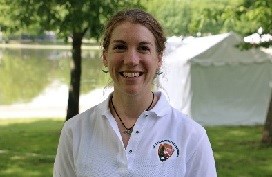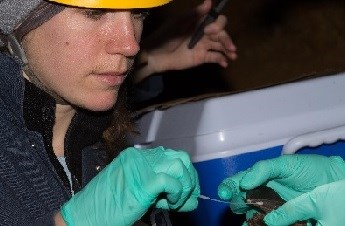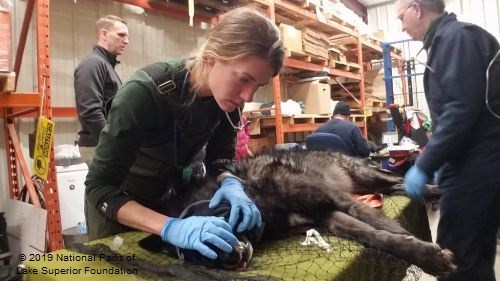
Photo by Julie West / NPS
Michelle Verant is a wildlife veterinarian for the National Park Service under the Natural Resource Stewardship and Science Directorate (NRSS) in Fort Collins, Colorado. NRSS is a national office, and provides scientific, technical, and administrative support to national parks for the management of natural resources. Michelle looks at wildlife health and ways the public can help wildlife in the national parks. She has taken a particular interest in bats.

Photo by Heather Kaarakka, WDNR
Bats eat insects and thus provide natural pest control. There are over forty species of bats in the United States, and more than one thousand species worldwide. Bats are the only flying mammal, and are extremely adaptable. Some bats are native to the Americas, Europe, Africa, Asia, and Australia. Some have even been found above the arctic circle! Michelle points out that there are many benefits from bats, including pest control, pollination, and seed dispersal to name a few. She says, “It would be a sad day if bats disappeared.”

Photo by National Parks of Lake Superior Foundation
At seven years old, Michelle knew she wanted to work with animals, but she never knew she would be working with moose, wolves, and bats! Growing up, she loved biology. Michelle says, “Biology just made sense.” At nine years old, she was hunting with her dad, and he became a role model for her. He was a physician who loved wildlife and the outdoors. Michelle was able to shadow him, and through him she learned that she wanted to help animals like he helped humans.
While in veterinary school, Michelle joined Envirovet. This program inspires veterinarians to become integral members of teams that protect animals, humans and ecosystem health in the one world everyone shares. Through this program Michelle learned that human and wildlife health is all connected. If there are diseases in wildlife, these diseases will cross paths into the health of humans. “It’s all connected. Healthy wildlife means healthy people.” Michelle says.
Throughout her career Michelle was given the opportunity to be heard. Her senior partners listened and valued her thoughts and opinions, which in turn made it easy for Michelle to work with everyone. She has continued to thrive in her career, and hopes future women in science do the same. Michelle tells future women scientists to have, “courage to try new things.” She reminds everyone to have confidence in themselves, “Everyone fails and that’s okay, but if you want to succeed you need to keep trying and asking questions.”
In the words of Brandon Seitz, a resource specialist at Grand Portage National Monument, Michelle Verant and her colleague Tiffany Wolf (with the Minnesota DNR), “exercised some of the most heroic veterinary measures I have heard of”. Michelle truly is an outstanding woman in science.
Last updated: August 17, 2020
